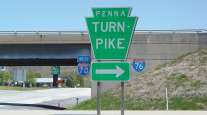Staff Reporter
Survey Reveals Ambivalence Over Washington, D.C.-Area Tolls

A recent poll surveying Washington, D.C.-area residents on transportation issues reveals mixed support for toll roads in the region.
George Mason University’s Schar School of Policy and Government and The Washington Post conducted the survey from April 25-May 2, focusing on topics from Metrorail to local bridges. They polled about 1,500 people, evenly sampling residents of Washington, Maryland and Virginia.

Hogan
The survey found 61% of respondents support the addition of express toll lanes on interstates 270 and 495 in Maryland. These additions are a feature in Maryland Gov. Larry Hogan’s plan for tolls in the Washington suburbs. Specifically, Hogan’s Traffic Relief Plan proposes using public-private partnerships to add toll lanes to I-270 in Montgomery County and the Capital Beltway (I-495), which passes through Montgomery and Prince George's counties.
Louis Campion, president of the Maryland Motor Truck Association, said the association supports the governor’s proposal.
Although the association opposes tolling on existing capacity, he said the addition of toll lanes could be a source of sorely needed congestion relief. Campion cited American Transportation Research Institute reports indicating that congestion cost the trucking industry $74.5 billion in 2016.
“For us, it’s really about the cost of congestion, which is enormous,” Campion said.
ATRI’s 2016 numbers are the most current estimates and report that truckers experienced nearly 1.2 billion hours of delay on the nation’s highways.

Campion
“As long as the new capacity is the only tolled portion and we aren’t obligated to use it, then we are generally supportive. If cars use it and it frees up some capacity on the untolled lanes, then that’s valuable for our industry, too,” Campion said.
Campion said truckers’ use of the proposed toll lanes would depend largely on the nature of the freight. For example, he said, certain sectors of the industry with time-sensitive work, such as the movement of household goods, may elect to use toll lanes for expediency.
According to the poll, 63% of respondents oppose a toll to drive into Washington during high-traffic times.
Congestion Survey by on Scribd
The question stems from a proposed congestion pricing study floated by Washington leaders. At a markup hearing in early May, the D.C. Council proposed allocating $475,000 to study congestion pricing for vehicles moving in and around the nation’s capital. Specifically, the study would assess congestion-pricing options for intra-District travel and movement into the city via I-66.
The study also would analyze a spate of other issues, including various pricing strategies, demographics, District residents versus nonresidents, geographic location and income levels.
READ MORE: District of Columbia Council proposes congestion pricing study
The proposed system in Washington bears a resemblance to those in other areas, such as New York City. New York Gov. Andrew Cuomo’s spending plan contains the Central Business District Tolling program, which will include electronic tolling devices posted along the perimeter of Midtown and Lower Manhattan. The Trucking Association of New York has opposed this plan.
Campion stressed the need for Washington-area lawmakers to weigh the perspective of the trucking industry when considering congestion pricing for the city. He pointed out that commuters have more flexibility in their travel options than truckers, who need to use roads to maintain their schedules for completing dispatches.
“Policymakers need to understand that the trucking industry, in most cases, is not selecting when they are able to deliver goods,” Campion said. “They’re being told when the receiver will accept goods.”


